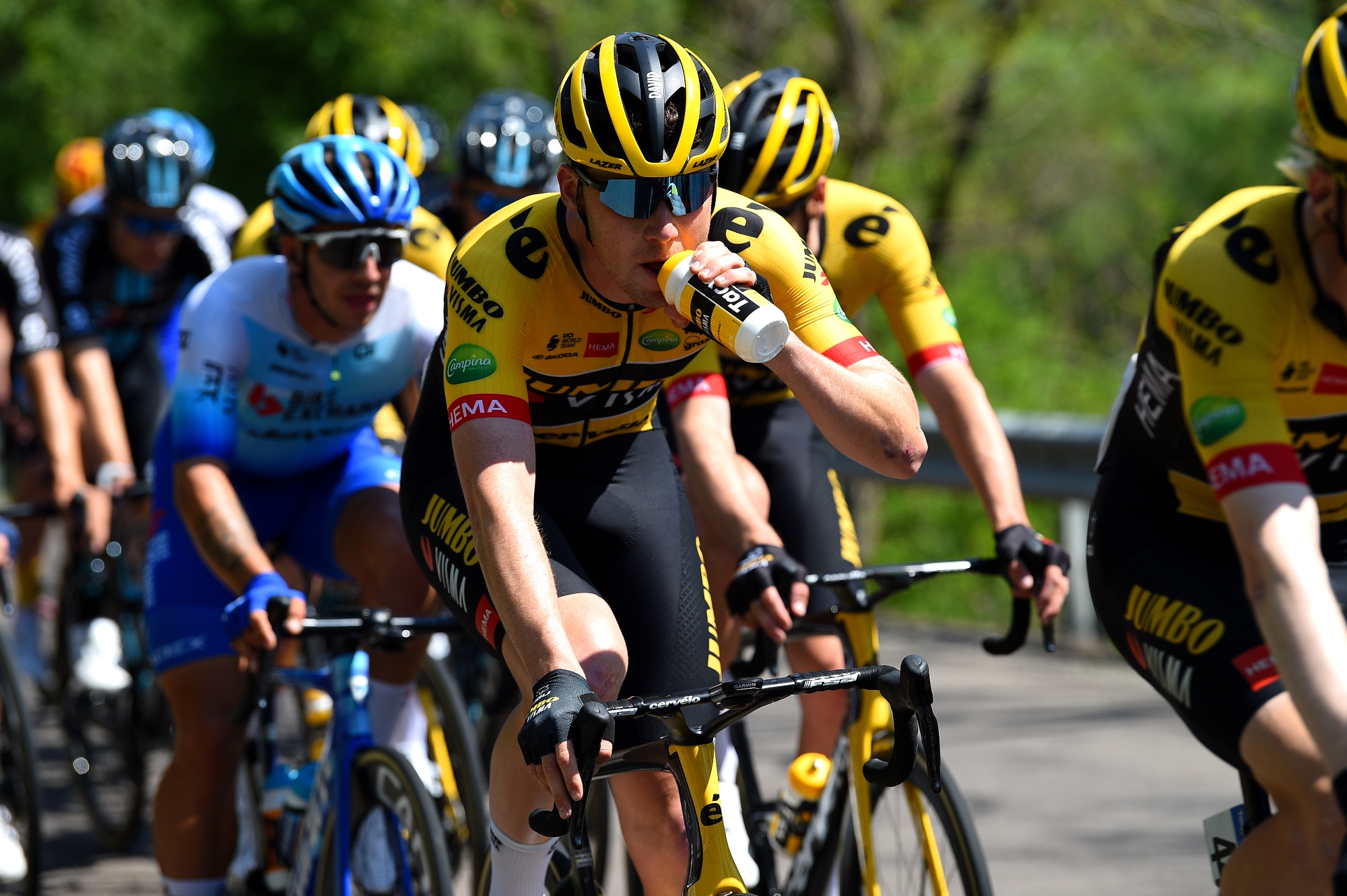Vuelta a Burgos race director blames David Dekker for stage two crash: 'It is a mistake by Dekker - it was not a speed bump'
Marcus Moral has responded to the criticism by suggesting it the Dutchman made a mistake on the "2.5cm high zebra crossing"

The Vuelta a Burgos race director has placed the majority of the blame of the stage two crash on David Dekker (Jumbo-Visma), stating he crashed after hitting a 2.5cm high zebra crossing, rather than a speed bump.
On the second stage of the Spanish race, Dekker flipped over his handlebars after hitting something on the road and losing control of the bike 700m from the finish line. Many other riders crashed and picked up injuries as a result, with AG2R Citroën rider Damien Touzé the worst affected rider as he suffered a head trauma and concussion after being thrown over the barriers.
Riders were left outraged at the decision to have what they believe a speed bump in the final kilometre of a race likely to include a sprint finish. Dekker's Jumbo-Visma teammate Edoardo Affini shared his grievances on Twitter, calling it a "disgrace" and "unacceptable".
However, the Vuelta a Burgos race director, Marcus Moral, has placed the blame at the door of Dekker, claiming race organisation is not at fault for the crash.
“It was not a speed bump, but a zebra crossing no more than 2.5 centimetres high, on a slope,” he told L'Equipe. “This obstacle was indicated by markings on the ground and by a signalman's flag. In preparation we showed the last three kilometres to the riders. It is impossible to find a track by removing roundabouts or passages like this one.
"It is a mistake by David Dekker. He has since realised this and has asked for forgiveness.
"I'm not saying it's just the rider's fault. It's everyone's fault. But we cannot attack the race organisation if the obstacle is indicated. I think the last kilometres of the second stage were correct. We take our responsibility, but people should not demonise us for that."
Get The Leadout Newsletter
The latest race content, interviews, features, reviews and expert buying guides, direct to your inbox!
UCI's race technical guide states major obstacles, such as road narrowing, traffic islands and barriers' should not feature in the final kilometre of a race. It is not clear whether or not the zebra crossing is a major obstacle at a stage conclusion.
For Dekker, though, he believes both he and the race organisers are at fault. He acknowledges he should have controlled his bike better as he hit the bump in the road, but also suggests race organisers made a mistake by choosing for the race to take this direction of travel.
"Yes, I was wrong not to hold the handlebar with the necessary force to pass over that bump of 75kmh," Dekker told WielerFlits. "But otherwise I think it's simple: if you break a UCI rule, you're wrong. Right?”
“If there's no obstacle, I won't fall. If we ride the same road in the opposite direction then we ride 40kmh and I or anyone else won't fall either.
"As riders we have to follow the rules: don't lie in the super tuck position, sprint in a straight line and throw waste in the right place. Then the organisation must follow the rules well enough, but the UCI itself must certainly monitor better.”
He continued, telling the Dutch publication he shouldn't have to take complete responsibility for the crash, claiming more should have been done to mitigate that circumstance from ever happening in the first place
“I realise that I made a mistake that I myself bear the consequences of, in the first place”, says Dekker. “But an obstacle so close to the finish and knowing that it is in a descending line is asking for trouble.
"No one falls or causes a fall voluntarily, but the peloton is voluntarily sent over this course. You're dealing with a runaway peloton battling for a stage win and GC riders looking to finish as close as possible in each stage.
"Then you know riders are going to the limit, and an organisation, the course designer and the UCI should take this into account.”

Thank you for reading 20 articles this month* Join now for unlimited access
Enjoy your first month for just £1 / $1 / €1
*Read 5 free articles per month without a subscription

Join now for unlimited access
Try first month for just £1 / $1 / €1
Ryan is a staff writer for Cycling Weekly, having joined the team in September 2021. He first joined Future in December 2020, working across FourFourTwo, Golf Monthly, Rugby World and Advnture's websites, before making his way to cycling. After graduating from Cardiff University with a degree in Journalism and Communications, Ryan earned a NCTJ qualification to further develop as a writer.
-
 FDJ-Suez, SD Worx-Protime, Lidl-Trek confirmed for Tour of Britain Women as strong list of teams announced
FDJ-Suez, SD Worx-Protime, Lidl-Trek confirmed for Tour of Britain Women as strong list of teams announced18 teams set to take part in four-day WorldTour stage race
By Tom Thewlis
-
 Cyclists could face life sentences for killing pedestrians if new law passed in England and Wales
Cyclists could face life sentences for killing pedestrians if new law passed in England and WalesReckless cycling currently carries a maximum two-year jail term
By Tom Thewlis